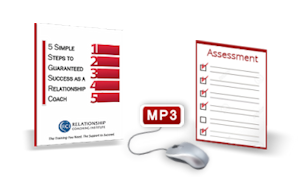 I’ve noticed that most life and relationship coaches seem to understand the importance of “empowerment” and removing “ego” as important reasons for not playing “expert” and giving our coaching clients advice. When you’re helping functional people, this is the enlightened and evolved service methodology. More about that here.
I’ve noticed that most life and relationship coaches seem to understand the importance of “empowerment” and removing “ego” as important reasons for not playing “expert” and giving our coaching clients advice. When you’re helping functional people, this is the enlightened and evolved service methodology. More about that here.
But in more than two decades as a coach and coach trainer, I’ve noticed that the most overlooked, unacknowledged and important reason for not giving advice in life and relationship coaching is that there is never a definitively “right” or “wrong” answer, choice, or thing to do. Never. Ever.
Perhaps as a profession we haven’t emphasized this enough, so here is an attempt to do so.
In addition to the need to empower our clients, telling them our opinion or belief or even providing proven facts (there really aren’t that many in this arena) doesn’t work because it’s the client’s journey based upon the client’s vision, wants, needs and requirements related to what would make their life and relationships happy and fulfilling and there is no “right” or “best” thing to do that can come from us.
Hard Science vs. Soft Science
There is a difference between a “hard science” such as medicine, physics, mathematics, etc. where research can uncover objective, empirically proven truths and facts, and a “soft science” like Psychology and anything non-physical and subjective related to humans, in which there is so much variation that research cannot identify anything that is true for all people, especially around relationships and happiness.
“Science” belongs in the objective, physical world of things that can be reliably measured and replicated. Anything related to human psychology, emotions, behavior or relationships is variable, subjective and can’t be measured using the same scientific standards of the objective world. Research on human behavior and related topics uncovers trends and patterns, but can not be applied as reliably predictive for a particular individual and there are no definitive facts that apply to all. Constructs such as “introversion” and “extroversion” sound black and white, but when applied to real humans they are all gray and variable.
If something is not true for all people it is not an objective fact, which means that if you choose to use a particular intervention or strategy with a client, it is more of something that you believe will be helpful to them.
With so much variation and so many variables, nothing will be 100% effective for all people or 100% ineffective for all people, so when it comes to people, especially relationships, not much is definitive, so research results don’t tend to be too helpful.
Those in the helping professions concerned with scientific research typically value “evidence-based” approaches to helping clients, which on the surface is a good thing. However, as mentioned above, there are so many variables at play, such as the training and skills of the helper, the individual client, and their situation, that even the best, most proven “evidence-based” approach won’t work for all people all the time.
For example, research shows that psychotherapy, including couples therapy, is ineffective most of the time. Does that mean no one should seek therapy or that therapists should find another profession? Not at all. Therapy is helpful in certain situations with certain clients who work with certain therapists, and there is no need to dismiss an entire profession because it doesn’t meet a “scientific” standard.
What Works for Each Client is What Matters
In relationship coaching we have some proven tools and paradigms that we know work, but they are optional and we are not attached to them and don’t expect them to work for all our clients. What matters is what works for them, not what “scientific research” says.
- “I recommend that you….”
- “In my opinion you should…”
- “I suggest….”
- “Research demonstrates definitively that…”
- “The effective solution here would be….”
All of the above are appropriate coming from a “hard science” professional such as a physician, architect, engineer, accountant, even a car mechanic, but NOT when it comes to the squishy soft variable, idiosyncratic, complex life choices and relationship functioning that require the individual to take responsibility and learn how to make effective choices because there is no absolute right or wrong thing to do and you can’t control the outcome like taking antibiotics for an infection or replacing a part on a car.
Worst of all are judgments couched as advice, such as:
- “You have an unhealthy relationship.”
- “He’s not right for you.”
- “You should tell him off”
- “He’s taking advantage of you.”
- “You’re being a victim.”
So we can’t be attached to what we “believe” will work for our clients and must help them uncover what works for them. Some clients can be helped with this empowering approach, and some will not, and since we don’t know ahead of time, we just do our best with each client, knowing that they are responsible for their results, not us.
What matters is what works, which will vary from client to client, and nothing will work for everyone, which is an important reason why we can’t play expert and provide advice or suggestions because the client needs to be in the driver’s seat, not the coach.

